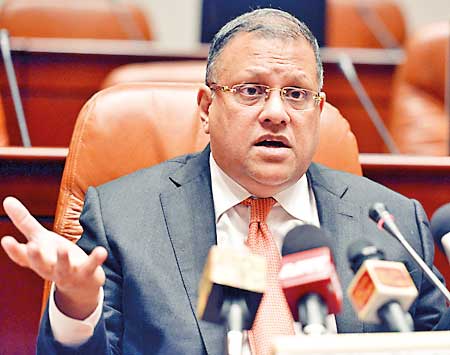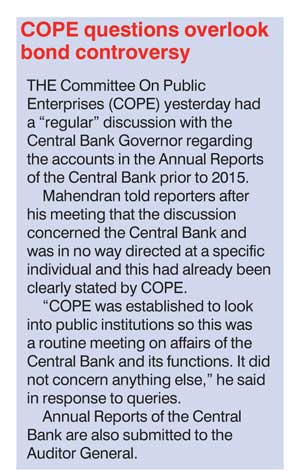Wednesday Feb 18, 2026
Wednesday Feb 18, 2026
Friday, 26 February 2016 00:32 - - {{hitsCtrl.values.hits}}
By Uditha Jayasinghe
Despite the “unfortunate” rise in interest rates the Central Bank yesterday declined to rule out a future rate hike later in the year and insisted negotiation with the International Monetary Fund (IMF) was crucial to reassuring the financial world of Sri Lanka’s stability to reduce possibility of a sovereign ratings downgrade. 
Fiscal consolidation remains the “single biggest concern” for the Central Bank, admitted Governor Arjuna Mahendran, but insisted the Government was not going “begging bowl in hand to the IMF.” Instead, he insisted, the strategy is to involve the IMF to formulate a consensus based transparent plan to take before lenders, investors and other economic stakeholders so the world would have confidence in Sri Lanka’s future growth plans.
Referring to the raise of interest rates by 50 basis points last week Mahendran explained that it was in reaction to excessive bank lending that topped 25%. Under the regulations of the Central Bank any growth beyond 15% required the institution to warn the Finance Minister in writing of possible overheating dangers but the CB Chief emphasised a balancing act would be maintained to ensure low inflation and growth despite the rise in interest rates.
He also acknowledged hope that increased interest rates would reduce the outflow of foreign investments from Sri Lanka. “All emerging markets are facing this problem. We are trying to reduce outflow to prevent the rupee going into freefall and for the foreign exchange situation to become acute. Interest rates have only been restored to levels seen in early 2015 so we do not expect a slowdown in growth.” 
However, if Middle Eastern wealth funds continue to liquidate their investments to prop up Government spending pressured by falling oil prices and rates are hiked for a second time by the US Federal Reserve, Sri Lanka could find itself mirroring international events, Mahendran noted.
“We will do our best to keep it at this point but it will be largely decided by international events….. I will not rule it out.”
Describing discussions with the IMF as “very constructive, frank and amicable” the Governor went onto say both sides were “hammering out a way forward that will pay debts without slowing growth.” “Sri Lanka is no longer a poor country. We have to depend on international markets to meet our funding requirements. Having a framework with the IMF will give consensus and clarity and get a seal of approval from international markets.”
Admitting Sri Lanka has piled up a “huge amount of debt” in the past decade Mahendran nonetheless was upbeat that an IMF program would encourage “rating agencies to come along with us.”
Last month analysts warned Sri Lanka could see a downgrading of its sovereign rating if it did not tackle the Budget deficit issue and the Governor said the Central Bank was aware of the concern.
An IMF arrangement would also cushion reserves, which will face depletion from upcoming debt repayments. But reserve spending over the last few months has dwindled rapidly, noted Mahendran, from about $1 billion to “just tens of millions” since late 2015.
Officials from the IMF were also coordinating with the Government to clean up key State Owned Enterprises that have racked up billions of debt, Mahendran revealed. “We want to clean the balance sheets of these corporations so managers can them has profitable companies and raise funds on their own. We are trying to look into the numbers…. Raise revenue. It can be done.”